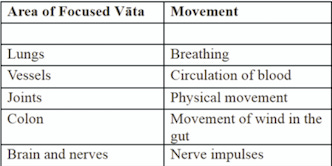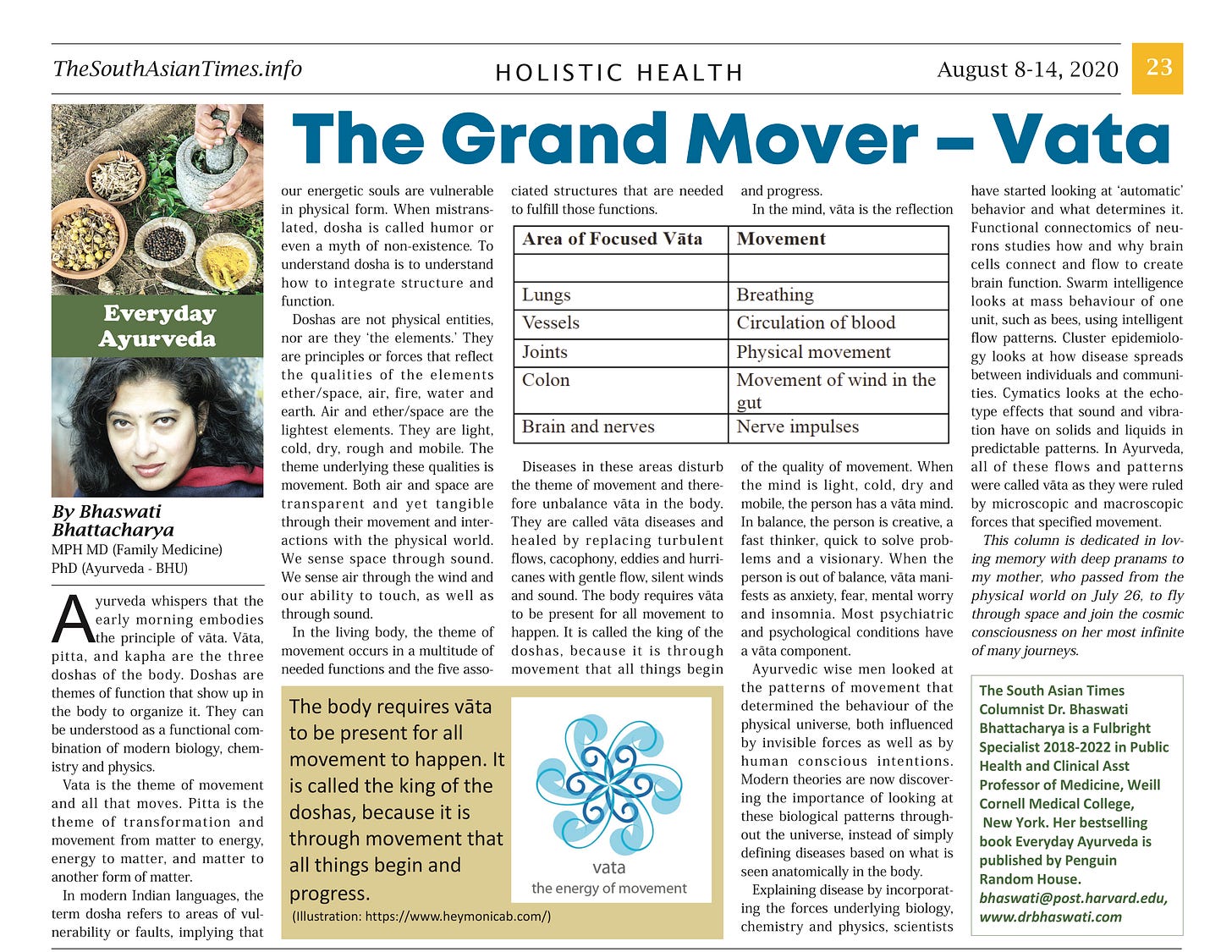Vata, the Grand Driver
It is through movement that all things confer their sense of existence and by which life progresses. Stop moving and you cease to be perceived. You die.
The Grand Mover - Vata
Ayurveda whispers that the early morning embodies the principle of vāta. Vāta, pitta, and kapha are the three doshas of the body. Doshas are themes of function that show up in the body to organize it. They can be understood as a functional combination of modern biology, chemistry and physics.
Vata is the theme of movement and all that moves. Pitta is the theme of transformation and movement from matter to energy, energy to matter, and matter to another form of matter.
In modern Indian languages, the term dosha refers to areas of vulnerability or faults, implying that our energetic souls are vulnerable in physical form. When mistranslated, dosha is called humor or even a myth of non-existence. To understand dosha is to understand how to integrate structure and function.
Doshas are not physical entities, nor are they ‘the elements.’ They are principles or forces that reflect the qualities of the elements ether/space, air, fire, water and earth. Air and ether/space are the lightest elements. They are light, cold, dry, rough and mobile. The theme underlying these qualities is movement. Both air and space are transparent and yet tangible through their movement and interactions with the physical world. We sense space through sound. We sense air through the wind and our ability to touch, as well as through sound.
In the living body, the theme of movement occurs in a multitude of needed functions and the five associated structures that are needed to fulfill those functions.
Diseases in these areas disturb the theme of movement and therefore unbalance vāta in the body. They are called vāta diseases and healed by replacing turbulent flows, cacophony, eddies and hurricanes with gentle flow, silent winds and sound.
The body requires vāta to be present for all movement to happen. It is called the king of the doshas because it is through movement that all things begin and progress.
In the mind, vāta is the reflection of the quality of movement. When the mind is light, cold, dry and mobile, the person has a vāta mind. In balance, the person is creative, a fast thinker, quick to solve problems and a visionary. When the person is out of balance, vāta manifests as anxiety, fear, mental worry and insomnia. Most psychiatric and psychological conditions have a vāta component.
Ayurvedic wise men looked at the patterns of movement that determined the behaviour of the physical universe, both influenced by invisible forces as well as by human conscious intentions. Modern theories are now discovering the importance of looking at these biological patterns throughout the universe, instead of simply defining diseases based on what is seen anatomically in the body.
Explaining disease by incorporating the forces underlying biology, chemistry and physics, scientists have started looking at ‘automatic’ behaviour and what determines it. Functional connectomics of neurons studies how and why brain cells connect and flow to create brain function. Swarm intelligence looks at mass behaviour of one unit, such as bees, using intelligent flow patterns. Cluster epidemiology looks at how disease spreads between individuals and communities. Cymatics looks at the echo-type effects that sound and vibration have on solids and liquids in predictable patterns. In Ayurveda, all of these flows and patterns were called vāta as they were ruled by microscopic and macroscopic forces that specified movement.
This column is dedicated in loving memory with deep pranams to my mother, who passed from the physical world on July 26, to fly through space and join the cosmic consciousness on her most infinite of many journeys.
week20. TheSouthAsianTimes
Obtain the .pdf version of this column by clicking on the image.
Dr. Bhaswati Bhattacharya is a Fulbright Specialist 2018‐2023 in Public Health. She serves as Clinical Asst Professor of Family Medicine in the Department of Medicine at Weill Cornell Medical College in New York, NY. Her bestselling book Everyday Ayurveda is published by Penguin Random House. To order an autographed copy, write to bhaswati@post.harvard.edu.
www.drbhaswati.com






